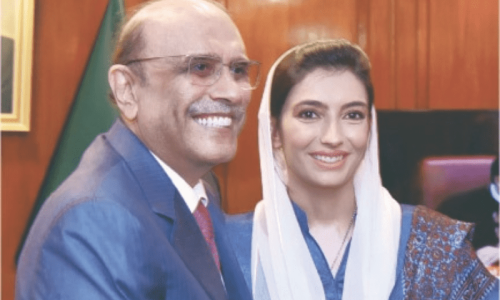KARACHI: A comprehensive plan of action was suggested on Tuesday at a seminar on security of religious minorities to tackle the imbalance of power enjoyed by certain pockets of society.
The seminar titled ‘Safety and security of religious minorities: role of state and society’ was organised by the Pakistan Institute of Labour Education and Research (Piler).
The speakers highlighted the need to reinforce the importance of empowering minorities in Pakistan, as many instances have shown that this neglect caused widespread losses to both property and human life.
Advocate Kalpana Devi, who has been fighting for the right of minorities for almost two decades, shared her struggle and the threats faced by religious minorities. She said: “The struggle to be recognised as citizens of the country can only be fruitful if the state frames laws that protect us. If we still are following an outdated constitution without any amendments to our status, we will never be given the same opportunities and protection.”
She recounted instances where her religion was used as an excuse, even in the courts of law, to deprive her and her clients of their basic rights.
“We need amendments in the manual of the family law and must be recognised as sons of the soils; we are not Indian, but Pakistani.”
Shahla Qureshi, the first woman assistant district officer of the Frontier Constabulary, Sindh, outlined the various bills and laws passed by the Sindh government for the protection of religious minorities. From introducing a five per cent quota, to passing a law against forced conversions and cracking down on hate material being taught in schools, “there are many measures in place to provide a safe haven for all religious minorities. What is lacking, however, is implementation,” she said.
Social activists and human right advocates have tried to put pressure on the government to rectify this, especially in light of the judgement passed by the Supreme Court of Pakistan for the protection of rights of religious minorities.
Columnist Qazi Sheikh criticised the media for airing content that has the potential of inciting religious intolerance.
“There are many shows being aired on television that pick up contentious topics and have resulted in attacks on religious minorities. Why is no law in place to check such content being aired to millions?” he questioned.
Highlighting the media role to help safeguard minorities, he suggested the need to “dilute the conservative narrative prevalent in the media” to spread the message of tolerance.
Dr Riaz Sheikh of Szabist gave a more theoretical account of why minorities are formed, and how a modern state does not entertain the concept of a minority and majority, and the necessity of Pakistan to adopt this.
“We need to talk about and demand civil law, rather than religious law to prevent marginality and poverty,” he said, adding that civil society is an important force that can propel this change.
Sorath Thebo of the Pakistan Muslim League-Nawaz questioned the widely held belief of what a minority is. According to her, women form almost an equal per cent of population in Pakistan as men, and yet are discriminated against.
Speaking of Sindh, she called it the “land of the Sufis which always enjoyed a liberal outlook. However, this is no longer so.”
She also criticised the lack of implementation of laws in securing the rights of members of different religions, but was unable to share a more concrete direction to improve the state and security of religious minorities.
Also, Dastageer Project was introduced at the seminar. Functional in almost 13 cities spread over Sindh, Punjab and KPK, the project works towards making justice more accessible to vulnerable populations. It aims to provide legal aid to victims of gender-based violence, and those affected by religious and ethnic discrimination.
Published in Dawn, July 1st, 2015
On a mobile phone? Get the Dawn Mobile App: Apple Store | Google Play














































